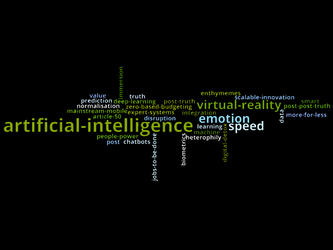2016 Review: most significant development
AI/AR/VR
“Virtual Reality. VR’s fast adoption and rapid development makes it appealing for gamers and researchers alike.” Joe Staton, client services lead, GfK market opportunities & innovation
“Deepmind beating a human champion at Go. A high profile indication of the speed of progress in AI. Significant in terms of what AI will be able to do fairly soon; significant also for the platform it gives industry shysters to exaggerate their use of AI right now.” Matt Lynch, chief strategy officer, Big Sofa
“While it is still in the very early phases, the application of AI to research analysis is likely the most significant technology development in 2016. While offerings like GlimpzIt (image recognition) and ReMesh (machine learning driven qual interviewing) are just getting started, coupling machine learning and AI with human curation will be an important trend for research.” Jamin Brazil, CEO, FocusVision
automation
“Automation. Not to say automation is new by any means, rather we’re seeing companies adopt automated solutions en masse. The steps required to execute market research surveys have been automated, and now companies can purchase survey solutions without picking up the phone or sending an email. We’ve also automated survey methodologies, and survey researchers can execute even customised studies with a few clicks of a mouse. Now, we’re crossing a new chasm, and starting to see automation of interpretation based on high-value analytics platforms and easy-to-understand data presentations.” Frédéric-Charles Petit, CEO, Toluna
“Improvements in technology and the increasing role of automation in research have resulted in much faster (real time in some instances) and more cost effective research solutions for clients.” Susan Vidler, head of research, Harris Interactive
behavioural science
“Behavioural science has firmly moved from laboratory based experiments into real world trials which have clearly shown how nudging can be even more powerful if contextually sensitive.” Crawford Hollingworth, founder of The Behavioural Architects
“We have seen the market tip heavily towards behavioural science. Many psychology graduates have wondered why this has taken so long and to some extent this addresses some of the over-claims that have been made on behalf of ‘traditional’ tools. But there is also the danger that we fail to respect the boundaries and qualifications of this discipline.” Colin Strong, global head of behavioural science, Ipsos
Social listening
“Social listening broadened its footprint, not just as a way of quantifying sentiment but as a rich linguistic data source that can be mined more deeply and longitudinally for insight. The added attraction being an ability to then locate audiences directly in social media channels and target them with relevant content in real/near time.” Alison Drummond, head of insight & analytics, Carat
programmatic
“Programmatic and DMP’s (Data Management Platforms) have transformed the advertising industry. Location, and audience based targeting of advertising, in app using device ID has developed significantly in 2016. We are starting to embrace this approach in research to gain a deeper understanding of audience profile and advertising effectiveness. Combining behavioural, geo and declarative data sources will develop further next year also.” Christian Dubreuil managing director EMEA at Research Now
“Though we originally experienced it as programmatic ad buying, our industry picked up the term and applied it to everything – programmatic sampling, programmatic surveys, programmatic marketing. Automation and technology will soon take over much of what used to be standard daily tasks.” Annie Pettit, research methodologist
traditional research
“The continuing value placed on qualitative research and connecting with people – the fact that clearly after the big splash about ‘Big Data’ marginalising research the realisation that actually qualitative research has a vital role to play in making what are often just numbers, and dirty ones at that, make some kind of sense.” Anna Cliffe, joint managing director at Trinity McQueen
“Return to traditional methods. Simple, well conducted, well analysed, well reported.” Deborah Mattinson, founder director, Britain Thinks
“This has been the year that research innovation finally ground to a halt. Not true as I am sure my fellow contributors will prove, but I do wish the research industry would get over its addiction to innovation. Innovation is great but the classic skills have timeless relevance.” Peter Totman, qualitative director, Jigsaw Research
Tomorrow we will be sharing the 2016 buzzwords

We hope you enjoyed this article.
Research Live is published by MRS.
The Market Research Society (MRS) exists to promote and protect the research sector, showcasing how research delivers impact for businesses and government.
Members of MRS enjoy many benefits including tailoured policy guidance, discounts on training and conferences, and access to member-only content.
For example, there's an archive of winning case studies from over a decade of MRS Awards.
Find out more about the benefits of joining MRS here.













0 Comments